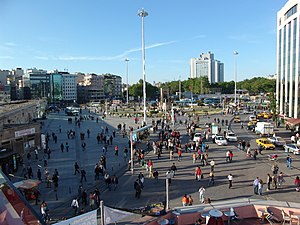Today Elif and I went to the court of Dilek’s boyfriend Cos, who’s a judge. We got to sit in on one case, involving a guy who sold meat in a different district of Istanbul than he was supposed to; when a cop confiscated his meat and checked it and returned it, the man noticed some meat was missing and got into a fight with the cops, who arrested him.
Cos: “Do you have papers for the tax?”
Man: “Right now I’m going around, I’m not in my store.”
Cos: “What?”
The man had a barely intelligible Kurdish accent.

Man: “Well, the meat was illegal to sell, but I had 100 kilos of it, and they took it.”
Cos: “Your son cursed at the council members.”
Man: “My son didn’t curse at them. I was with my son. My son wasn’t even there.”
Now it’s becoming clear – the man and his son are not in front of the judge because of the uninspected (and now missing) meat, but because they cursed at a government worker, which turns out to be a crime. The boy is talking.
Boy: “I wasn’t there at all. I heard that they took the meat away. I heard that they arrested my father. It was 200 kilograms.”
Man: “No it wasn’t that many kilograms.”
Cos: “That’s not what we’re here for. Tell me truthfully. Are you missing any meat?”
Man: “They’re not letting me know anything about it. I don’t know anything about it. I don’t know how to get it back.”
Cos: “I don’t either!” (to himself:) “OK, he can go…I don’t believe the government worker; it’s not written what they said specifically, it just says ‘They cursed at us.'”
The man and his boy were released, and it made me think hard about freedom of speech here. If cursing at a government official is a crime, what would happen on-camera – and will we be able to film? We went to the house of Ayse Onal, reporter from Channel 7, who cooked us a homemade halvah with cheese; she told us her son would ask her, “What kind of reporter do you think you are, if you were never arrested?” Another of our potential subjects, Oral Calislar, columnist for Cumhuriyet Newspaper, had to go to court the day after we met with him, to be sentenced to prison for his interview with Apo, the leader of the PKK Kurdish revolutionary party.
In Turkey, “inappropriate” speech can get you jailed, or killed on the street with bombs or guns. But you can actually get your voice heard here. There are at least fifteen different newspapers, from socialist to religious to fascist. People watch the news and talk about it on the street. But In America, where there’s more freedom to say what you want, good luck getting heard, and good luck getting in a 30-second sound byte which flies in the face of the entire corporate system in which the program exists without sounding like a nut. Or to get past the TV reporter’s questions like “We know the Gulf War was a good thing, but did we make the right strategic decision to pull out so early?” Also, it’s all too easy to believe in free speech as an abstract, inalienable right if you live in a place where most outlier ideas and malicious memes can easily be marginalized, absorbed, or destroyed, as happened to David Koresh in Waco. Turkey, on the other hand, feels far closer to becoming a theocratic nation. Outside of Istanbul’s Dolmabahçe Palace, there’s a neon sign reading: “We love our Democracy, we love our Turkish Republic.” Of course, if there were consensus, such a sign would not be necessary. Istanbul’s current mayor, Tayyip Erdo?an, the self-proclaimed “Imam of Istanbul,” gave a speech in Diyarbikkir, where he said that the minarets were bayonets and that his people were Allah’s army who would forge a country of God. For this, he was found guilty of treason by the Supreme Court, which means that he has to serve 4 months and 12 days in jail, and he’s permanently barred from politics. He appealed his sentence yesterday and will go to jail if his appeals run out. What I’d like to happen to him I guess makes me a Marcusian, with no tolerance for intolerance.
All of this thought about free speech came home to roost when we tried to shoot preparatory footage of Taksim Square. We were filming the Ataturk sculpture, and a vanful of police pulled up to us. They asked, “Which TV station are you from?” Elif answered, “None.” They asked, “Why are you shooting it then?” and Elif answered, “I’m a tourist, and I want to bring the footage home.” The police did not believe her, and they kept asking what’s the film for, and Elif kept insisting that we were tourists, and we showed them our American passports, which we were lucky to have on us, and they told us we weren’t allowed to film on Taksim Square.
Elif’s mother freaked out when we got home and pleaded with Elif not to make the film, which led to a fight in which Elif threatened to move out and make the film anyway. Dilek was undeterred and pulled me aside, telling me that it was “very dangerous” and that I should tell Elif not to make the film, “very dangerous.” I told her to talk to Elif herself. Then, Dilek went to our secretary, who pulled me aside and told me to tell Elif not to make the film, that it was too dangerous, which led to another fight. It was too late for such considerations. By plunging right in, we’d forced ourselves to do it. We had the equipment, we had a secretary and two cameramen, we had our first interviews lined up. We were going to film.
